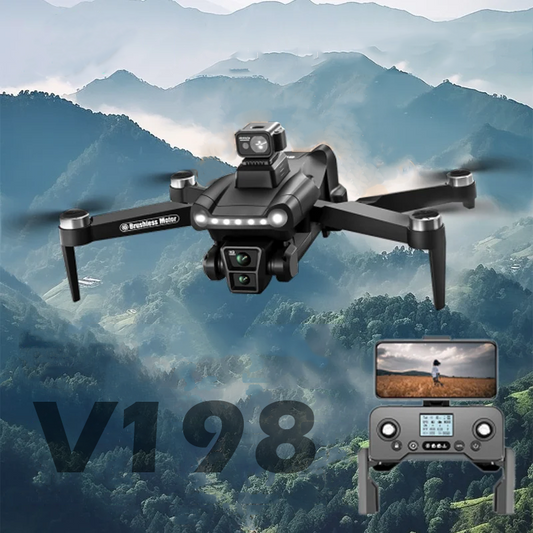How to Start a Drone Business: A Step-by-Step Guide

The drone industry is soaring, offering lucrative opportunities for entrepreneurs willing to take flight. Whether you're interested in aerial photography, surveying, inspections, or delivery services, starting a drone business can be a rewarding venture. This step-by-step guide will walk you through the essential steps to launch a successful drone business.
1. Research the Market
Before diving in, it's crucial to understand the drone market and identify potential niches. Research current trends, demand for drone services, and your competition. Popular drone business ideas include:
- Aerial Photography and Videography: For real estate, events, and advertising.
- Surveying and Mapping: For construction, agriculture, and environmental monitoring.
- Inspections: For infrastructure, utilities, and insurance.
- Delivery Services: For parcels and medical supplies.
- Drone Training and Education: Teaching others how to fly drones.
Understanding the market will help you identify a niche that aligns with your skills and interests.
2. Develop a Business Plan
A solid business plan is essential for any startup. It outlines your business goals, strategies, and financial projections. Key components of a drone business plan include:
- Executive Summary: A brief overview of your business, including your mission statement and objectives.
- Market Analysis: Insights from your market research, including target customers and competition.
- Services Offered: Detailed descriptions of the drone services you plan to offer.
- Marketing and Sales Strategy: How you plan to attract and retain customers.
- Operational Plan: The logistics of running your business, including equipment, technology, and staffing.
- Financial Plan: Budget, funding sources, and financial projections.
3. Obtain Necessary Certifications and Licenses
Operating a drone business requires specific certifications and licenses. In the United States, you'll need to obtain a Part 107 Remote Pilot Certificate from the Federal Aviation Administration (FAA). This certification ensures you understand the regulations and safety practices for commercial drone operations. Key steps include:
- Study the Regulations: Familiarize yourself with the FAA's rules and regulations for commercial drone use.
- Pass the Knowledge Test: Take and pass the FAA's Aeronautical Knowledge Test to earn your Part 107 certificate.
- Register Your Drone: Register your drone with the FAA and label it with the registration number.
Depending on your location and the nature of your services, you may need additional permits or licenses.
4. Invest in the Right Equipment
Choosing the right drones and equipment is critical to the success of your business. Consider the following:
- Drones: Select drones that are suited to your niche. For example, a drone with a high-resolution camera is ideal for photography, while a drone with thermal imaging capabilities is better for inspections.
- Cameras and Sensors: Invest in high-quality cameras and sensors to meet your clients' needs.
- Software: Use software for flight planning, data analysis, and post-processing. Popular options include DJI Pilot, Pix4D, and DroneDeploy.
- Accessories: Extra batteries, propellers, and carrying cases are essential for operational efficiency.
5. Ensure Compliance with Regulations
Staying compliant with local, state, and federal regulations is crucial. In addition to obtaining the necessary certifications and licenses, follow these guidelines:
- Airspace Authorization: Obtain authorization if you plan to operate in controlled airspace.
- Insurance: Purchase liability insurance to protect your business in case of accidents or damages.
- Privacy Laws: Respect privacy laws and avoid capturing images or data without consent.
6. Build a Strong Online Presence
A professional online presence is vital for attracting clients. Key elements include:
- Website: Create a user-friendly website showcasing your services, portfolio, and contact information. Optimize it for SEO to rank higher in search engine results.
- Social Media: Use platforms like Instagram, Facebook, and LinkedIn to share your work, engage with potential clients, and build your brand.
- Content Marketing: Start a blog to provide valuable information related to drone services, which can help establish you as an industry expert and improve your website's SEO.
7. Develop a Marketing Strategy
Effective marketing is essential for growing your client base. Consider the following strategies:
- Networking: Attend industry events, join local business groups, and connect with potential clients and partners.
- Online Advertising: Use Google Ads, social media ads, and other online advertising platforms to reach your target audience.
- Email Marketing: Build an email list and send regular newsletters to keep potential clients informed about your services and special offers.
- Partnerships: Collaborate with real estate agents, construction companies, and other businesses that can benefit from your services.
8. Deliver High-Quality Services
Your reputation depends on the quality of your work. Focus on delivering exceptional service by:
- Understanding Client Needs: Listen to your clients and understand their specific requirements.
- Attention to Detail: Ensure your work is precise and meets high standards.
- Timely Delivery: Complete projects on time and communicate effectively with your clients.
9. Stay Updated with Industry Trends
The drone industry is rapidly evolving, with new technologies and regulations emerging regularly. Stay informed by:
- Continuing Education: Take advanced courses and attend workshops to enhance your skills.
- Industry News: Follow industry blogs, forums, and news outlets to stay updated on the latest trends and developments.
- Networking: Engage with other professionals in the drone industry to share knowledge and insights.
10. Scale Your Business
As your business grows, consider scaling your operations to meet increasing demand:
- Hire Staff: Bring on additional pilots, photographers, or administrative staff to help manage your workload.
- Expand Services: Diversify your service offerings to attract a broader range of clients.
- Invest in Technology: Upgrade your equipment and software to stay competitive and improve efficiency.
Starting a drone business requires careful planning, investment in the right equipment, and a strong marketing strategy. By following this step-by-step guide, you can navigate the challenges of launching your business and take advantage of the growing opportunities in the drone industry. Stay committed to delivering high-quality services, stay informed about industry trends, and continuously seek ways to improve and expand your business. With dedication and the right approach, your drone business can soar to new heights.
Explore a variety of drones at our online drone store.
Happy Flying!









